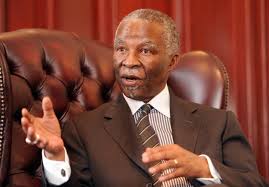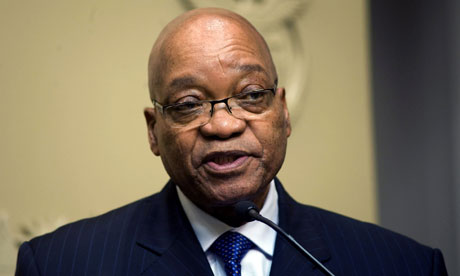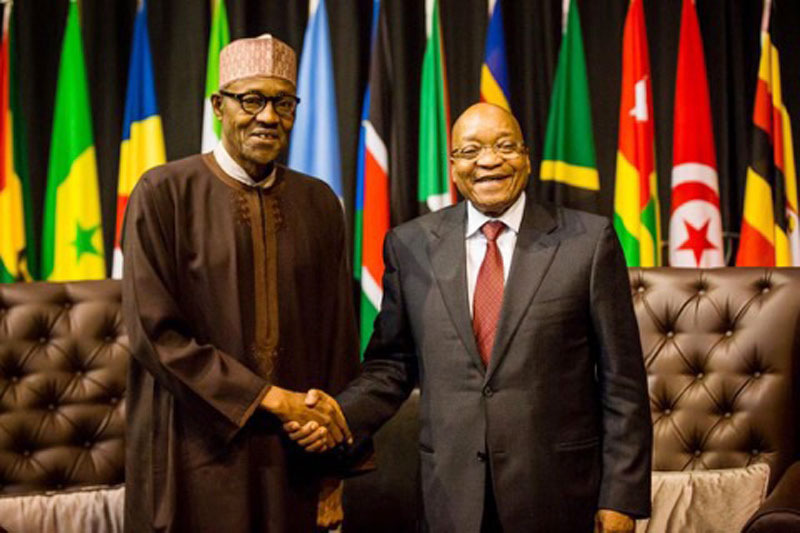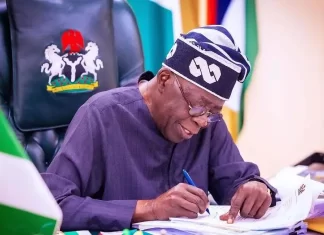By Ikechukwu Amaechi
I don’t know how many Nigerians are abreast of the political developments in South Africa.
On Tuesday, February 13, 2018, the Sowetan, a tabloid popular with urban black South Africans, said of the country’s embattled 75-year-old president, Jacob Zuma, “He’s a goner.” The mood in the country was celebratory.
As you read this, neither the country’s regular nor spy police had visited the offices of the newspaper or invited the editor(s) “for giving false statement, defamation of character and acts capable of inciting public disturbance.” as the Nigeria police are wont to do.
The Sowetan front-page headline followed the decision of the leadership of South Africa’s ruling party, the African National Congress (ANC) to recall (a euphemism for ‘remove from office’ ) President Zuma.
This is the second time the 106-year-old ANC would travel this route in national interest within a decade.
On Saturday, September 20, 2008, Zuma’s predecessor, the erudite, urbane, albeit intellectually arrogant Thabo Mbeki with whom he had been locked in a bitter political struggle agreed to step down as South Africa’s president after the ANC requested his resignation over allegations he misused his power.

Mbeki succeeded the legendary Nelson Mandela, who voluntarily stepped down after serving only one term of five years despite huge pressure to continue in office.
It was apparent that Mbeki had very little regards for Zuma’s competency and couldn’t contemplate handing over the reins of power to the man who was deputy president of the ANC then.
I recall one of my lecturers at the School of Journalism, Media and Cultural Studies, Cardiff University, Wales, Dr. Howard Barrell, a white South African who served in the underground ANC Intelligence both inside the country and from exile in the 1980s, telling me in 2007 that Zuma didn’t have the character and intellectual stamina to govern the country.
Barrell, who had written extensively on ANC’s tactical performance and on the uses of strategic nonviolent action in pursuit of political outcomes, knew the characters involved in the struggle and the issues. A devotee of Mandela and former editor of the Mail & Guardian, Barrell, whose PhD thesis at Oxford University (1993) is entitled: Conscripts to Their Age: ANC Operational Strategy, 1976-1986, knew Zuma’s inadequacies and didn’t envision any pathway to power for him.
But he was wrong.
Yes, Mbeki constitutionally called the shots as the president but the ANC was supreme and could sanction any officer of the state or the party. So, while he subtly sought to scuttle Zuma’s quest for power through the judiciary, an unimpressed ANC apparatchik in a country where the political party is supreme bared its fangs by recalling him a year before the expiration of his second term in 2009.
All it took for this dramatic event to unfold was a high court judge accusing President Mbeki of being part of a conspiracy to charge Zuma with corruption for political ends.
The judge, Chris Nicholson, said the prosecution of Zuma was the result of “baleful political influence.”
On that basis, one of South Africa’s most respected former judges, Willem Heath, called for Mbeki, his former justice minister, Penuell Maduna, and the former chief prosecutor, Bulelani Ngcuka, to be charged with crimes for pursuing a political prosecution. Heath told Mail and Guardian newspaper that South Africans needed protection from the “systematic abuse, detailed in the judgment, of organs of state by the president and his purported henchmen.”
“If the behaviour … is not addressed, the application of the principle of the separation of powers will remain at the whim of those who have seemingly been using it most effectively for personal gain.”
The events that followed were quite dramatic. Then ANC secretary general, Gwede Mantashe, told reporters in Johannesburg that the party’s NEC had decided to “recall the president before his term of office expires.”
Mbeki’s spokesman responded almost immediately. “The president has obliged and will step down after all constitutional requirements have been met.”
This was despite the fact that Mbeki had won praise for guiding the country’s economy through a period of sustained growth with his market-oriented economic policies.
Though the president was convinced of the rightness of his action against Zuma, he bowed to party supremacy and left office.

Now, it is Zuma’s turn to face the wrath of his party and fellow citizens who really believe unlike in Mbeki’s case that his scandal-plagued years in power had tainted Mandela’s ‘Rainbow Nation.’
Zuma, unlike Mbeki, didn’t throw in the towel immediately. But he knows the game is over. The party, the vehicle that conveyed him to power, has moved on, leaving him in a lurch.
The country’s deputy president, the inimitable Cyril Ramaphosa, a union leader and lawyer once tipped as Mandela’s pick to take over the reins, is now in control, having defeated Zuma’s ex-wife, Nkosazana Dlamini-Zuma, in December 2017 to assume the presidency of the ANC.
Zuma’s demand to resign within a time frame of three to six months as revealed by the incumbent ANC secretary general, Ace Magashule, is mere braggadocio.
If he refuses to go quietly, he will most likely suffer the indignity of being sacked by the parliament where he faces another ‘no confidence vote’ on February 28.
Zuma has become an embarrassment to the ANC and entire nation. South Africa’s economy, once touted as the most sophisticated in Africa, has stagnated, with banks and mining firms refusing to invest due to policy uncertainty and widespread corruption.
But it is instructive as some economic buffs have noted that the same economy started spluttering back to life since mid-November when Ramaphosa emerged as a real ANC leadership prospect.
In taking these titanic decisions on both Mbeki and Zuma, the interest of the country’s democracy was paramount to the ANC leadership. It was not about self, except, of course, where the country’s interest coalesced with either individual or group interest. It is country first. Decisions were taken to protect the commonwealth.
Both men paid their dues in the anti-apartheid struggle. Zuma spent 10 years alongside Mandela in the notorious Robben Island prison camp. Thabo Mbeki’s father, Govan Mbeki, was Madiba’s alter-ego in the ANC and South African Communist Party, as well as prison mate together with Walter Sisulu, Raymond Mhlaba, Ahmed Kathrada and others. While his father and other great ANC leaders were serving life sentence, Thabo, who was born into the struggle, kept the ANC torch aglow in exile.
But despite all these, Zuma had become a liability to both his party and the country and the party decided to the needful. That is leadership.
Contrast South Africa with the Nigerian scenario where Olusegun Obasanjo became president in 1999, the same year as Mbeki and his first task was to hijack the PDP, which he turned into his personal property, literally. He became a god who must be worshipped by the party that brought him to power, thereby dealing a mortal blow to party supremacy. Every other president since then has taken a cue from him.
In Nigeria, party leaders are errand boys of the president. The political party is only a vehicle with which politicians, with a sickening sense of entitlement, hitch a ride to power and discard thereafter.

Zuma is 75 years, the same age with President Muhammadu Buhari. Imagine the APC leadership telling Buhari not to run for second term for Nigeria’s sake. John Oyegun will lose his chairmanship of the party in a jiffy, with a possible visit from the Ibrahim Magu-led Economic and Financial Crimes Commission (EFCC).
There will be arguments that it is discourteous to so advice a 75-year-old man, the father of the nation. Some will contend that it is immoral to deny a man a second term, as if it is a birth right. A friend of mine said recently his religion forbids him to criticize a leader even when he is under-performing.
If APC means well for Nigeria, it should take some tutorials from the ANC and recall President Buhari now so as to minimise the damage his presidency has unleashed on Nigeria and Nigerians. But the party won’t because it is not about the people. Buhari represents interests that are antithetical to the people’s interests to whom the protection of life and property is a privilege, not a right.
Nobel Laureate Professor Wole Soyinka said on Tuesday that Buhari is under a trance, yet some people insist he is the only person with the capacity to govern Nigeria.
Yet, we wonder how and why Nigeria continues to “wobble and fumble.”













